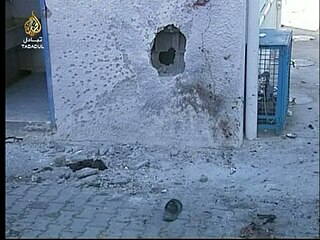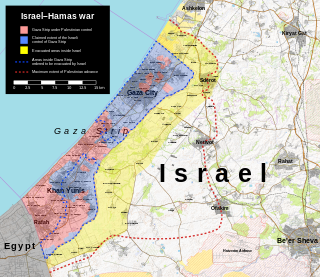Related Research Articles
This page is a partial listing of incidents of violence in the Israeli-Palestinian conflict in 2004.

The Popular Resistance Committees is a coalition of a number of armed Palestinian groups opposed to what they regard as the conciliatory approach of the Palestinian Authority and Fatah towards Israel.
The Murder of the Hatuel family was a shooting attack on May 2, 2004, in which Palestinian militants killed Tali Hatuel, a Jewish settler, who was eight months pregnant, and her four daughters, aged two to eleven. The attack took place near the Kissufim Crossing near their home in Gush Katif bloc of Israeli settlements in the Gaza Strip during the Second Intifada. After shooting at the vehicle in which Hatuel was driving with her daughters, witnesses said the militants approached the vehicle and shot the occupants repeatedly at close range.

In 2004, the Israel Defense Forces (IDF) launched Operation Rainbow in the southern Gaza Strip on 12–24 May 2004, involving an invasion and siege of Rafah. The operation was started after the deaths of eleven Israeli soldiers in two Palestinian attacks, in which M113 armored vehicles were attacked.
In 2004, the Israeli Defense Forces launched Operation "Days of Penitence", otherwise known as Operation "Days of Repentance" in the northern Gaza Strip. The operation lasted between 29 September and 16 October 2004. About 130 Palestinians, and 1 Israeli were killed.
This page is a partial listing of incidents of violence in the Israeli-Palestinian conflict in 2005.
On June 9, 2006, an explosion on the beach near the Gaza Strip municipality of Beit Lahia killed eight Palestinians. At least thirty others were injured. The aftermath of the incident was captured on video and showed a distressed eleven-year-old girl, Huda Ghaliya, reacting to the loss of family members, most of whom were killed in the incident. The footage of Ghaliya, which received considerable media attention, was broadcast on news networks around the world, making her a symbol of Palestinian suffering. The German newspaper Süddeutsche Zeitung questioned the reliability of the video footage.

In 2006 the Israel Defense Forces launched Operation "Autumn Clouds" beginning on 1 November 2006, following numerous rocket and mortar attacks on southern Israel, when the Israeli Defense Forces entered the Gaza Strip triggering sporadic fighting near Beit Hanoun. The operation was the first military endeavor undertaken by the Israeli military since Operation "Summer Rains" in the summer of 2006. The operation was launched to stop Palestinian rocket attacks into Israel.
The 2006 shelling of Beit Hanoun by the Israeli Defence Force (IDF) happened on 8 November, when shells hit a row of houses in the Gaza Strip town of Beit Hanoun, killing at least 19 Palestinians and wounding more than 40. The shelling followed the IDF's withdrawal from the Gaza Strip in completion of a week-long operation codenamed Operation "Autumn Clouds", which the Israeli government stated had been intended to stop the Qassam rocket attacks on Israeli civilians by Palestinian militants. The Israeli government apologized and attributed the incident to a technical malfunction.

The 2006 Gaza–Israel conflict, known in Israel as Operation Summer Rains, was a series of battles between Palestinian militants and the Israel Defense Forces (IDF) during summer 2006, prompted by the capture of Israeli soldier Gilad Shalit by Palestinian militants on 25 June 2006. Large-scale conventional warfare occurred in the Gaza Strip, starting on 28 June 2006, which was the first major ground operation in the Gaza Strip since Israel's unilateral disengagement plan was implemented between August and September 2005.
This is the Timeline of the Israeli–Palestinian conflict in 2007.

In 2008, Israel sought to halt the rocket and mortar fire from Gaza that killed four Israeli civilians that year and caused widespread trauma and disruption of life in Israeli towns and villages close to the Gaza border. In addition, Israel insisted that any deal include an end to Hamas's military buildup in Gaza, and movement toward the release of Corporal Gilad Shalit. Hamas wanted an end to the frequent Israeli military strikes and incursions into Gaza, and an easing of the economic blockade that Israel has imposed since Hamas took over the area in 2007.

The al-Fakhura school incident was an Israeli military strike that took place during the Gaza War on 6 January 2009 near a United Nations-run school in the Jabalia Camp in the Gaza Strip. According to the UN and several non-governmental organizations (NGOs), more than 40 people were killed. Israel reported the death toll as nine Hamas militants and three noncombatants with senior IDF officers stating that the death toll published by Hamas was "grossly exaggerated". Israel stated it fired on the school in response to militant gunfire believed to be coming from al-Fakhura. A UN inquiry said that there was no firing from within the school and there were no explosives within the school, but could not establish if militants fired from the vicinity of the school.

The 2006 Gaza cross-border raid was an armed incursion carried out by seven or eight Gazan Palestinian militants on 25 June 2006 who attacked Israel Defense Forces (IDF) positions near the Kerem Shalom Crossing through an attack tunnel. In the attack, two IDF soldiers and two Palestinian militants were killed, four IDF soldiers were wounded, one of whom was Gilad Shalit, who was captured and taken to the Gaza Strip.
Between 29 June and 5 August 2004, the Israel Defense Forces (IDF) conducted a raid on Beit Hanoun, a Palestinian town in the northern Gaza Strip. The stated goal of The 37-day-long invasion and siege, called Operation Forward Shield by Israel, was to prevent future rocket attacks from Gaza following the deaths of two residents of the Israeli town of Sderot on 28 June.
The following is a timeline of events during the Israeli–Palestinian conflict in 2020.

The battle of Beit Hanoun began on 27 October 2023 in the midst of the 2023 Israeli invasion of the Gaza Strip. On 18 December 2023, it was reported that Israeli forces had full control over Beit Hanoun and had destroyed Hamas’ Beit Hanoun Battalion. In spite of this, clashes continued in the town preceding the withdrawal of Israeli forces six days later.